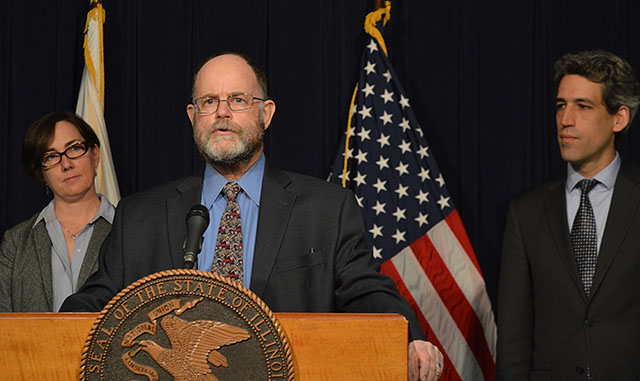Lawmakers Want Illinois To Stop Making Prisoners Pay For Their Incarceration
By aaroncynic in News on Feb 25, 2016 7:00PM

Alan Mills, Executive Director of the Uptown People's Law Center with Illinois State Representative Kelly Cassidy and Illinois State Senator Daniel Biss.
State Representative Kelly Cassidy and State Senator Daniel Biss have both introduced bills in the legislature that would prohibit the Illinois Department of Corrections from suing inmates for the cost of their room and board.
“It’s just wrong,” said Biss at a Wednesday morning press conference at the Thompson Center. “It’s practically and completely backwards thing to do. We know painfully well how difficult it can be for people coming out of the criminal justice system to find employment, housing, become integrated into society.”
More than 40 states allow for lawsuits against prisoners in this manner, and Illinois has been able to sue inmates for the cost of their incarceration since the '80s. According to a November 2015 investigation by the Chicago Tribune, the state hadn’t pursued such suits until 2015. Of the 31 parolees or inmates sued since 2010, the state netted $512,000, the majority from just two inmates.
The majority of those inside the Illinois prison system are poor, and many times inmates exiting the system have barely the clothes on their back and few resources on the outside to get their lives back together. The practice of suing those inmates or parolees leads to higher recidivism, which in turn ends up costing the state more money, according to proponents of the legislation.
Calling the practice “predatory,” Rep. Kelly Cassidy said:
“The odds are stacked against the men and women coming out of our prison system and attempting to put their lives back together. Any barrier to reentry is a path to recidivism. We need ot be doing everything in our power to remove those barriers, not add more.”
“It’s time we take these steps to repeal a relic of a time when our criminal justice system was almost single-mindedly focused on retribution,” she added.
In many of the cases, the state ends up suing former prisoners that come into small amounts of money either during or after their incarceration. Alan Mills, Executive Director of the Uptown People’s Law Center, which advocates and provides legal aid to both prisoners on the inside and former inmates, called that a “Sisyphean” process. “These guys go through hell in prison, they get out and begin to make a little bit of headway and the state comes and takes all that away. It’s absolutely crushing,” he said.
With a budget of more than $1.4 billion a year for IDOC, Mills also says suing prisoners makes no fiscal sense:
“It means more people go back in again, or it means people go on public aid...So in the end it doesn’t save anything, keeping these people in prison at an average cost of $28,000 per year. It’s a terrible thing, we need to stop doing it.”
It’s unclear whether Gov. Bruce Rauner would support a measure, but Biss told reporters he was hopeful that given the legal costs of pursuing prisoners in such lawsuits and the financial costs of recidivism, he would be open to signing it.
Rauner’s office did not immediately return a request for comment.